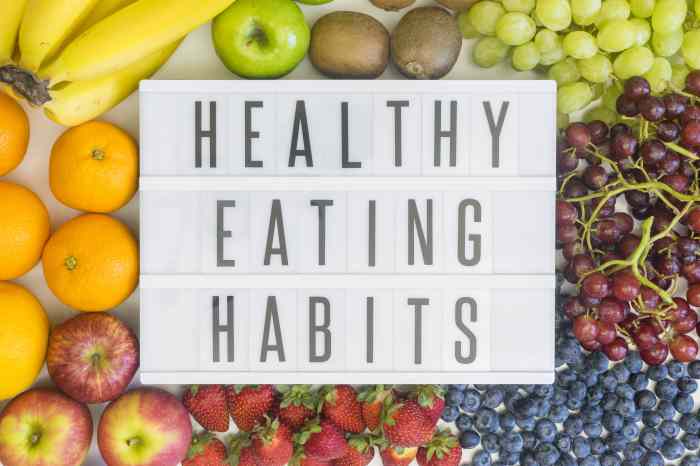Yo, diving into Healthy Eating Habits, get ready for a fresh take on fueling your body right. From boosting physical health to uplifting mental well-being, we’re about to break it down for you in a way that’s as cool as it is informative.
Let’s explore how to build a balanced diet, develop killer healthy eating habits, tackle common challenges, and even master weight management like a boss. Get ready to level up your nutrition game!
Benefits of Healthy Eating Habits

Eating healthy isn’t just about fitting into those skinny jeans – it’s about taking care of your body inside and out. When you fuel your body with the right nutrients, you’re setting yourself up for success in more ways than one.
Physical Health
Eating a balanced diet rich in fruits, vegetables, whole grains, and lean proteins can have a profound impact on your physical health. These foods provide essential vitamins, minerals, and antioxidants that help your body function at its best. They can also reduce your risk of developing chronic diseases like heart disease, diabetes, and certain types of cancer.
- Leafy greens like spinach and kale are packed with vitamins A, C, and K, as well as folate and iron.
- Fatty fish like salmon and mackerel are high in omega-3 fatty acids, which are important for brain function and reducing inflammation.
- Whole grains like brown rice and quinoa provide fiber and B vitamins for sustained energy and digestive health.
Mental Well-being
A healthy diet doesn’t just benefit your body – it can also support your mental health. Nutrient-dense foods can help regulate mood, improve focus, and boost overall cognitive function. On the flip side, a diet high in processed foods and sugar can lead to mood swings, fatigue, and difficulty concentrating.
- Blueberries are rich in antioxidants that can help improve memory and cognitive function.
- Walnuts contain omega-3 fatty acids and antioxidants that support brain health and reduce inflammation.
- Dark chocolate (in moderation) can boost mood and reduce stress thanks to its antioxidants and serotonin-boosting properties.
Components of a Balanced Diet: Healthy Eating Habits
Eating a balanced diet is crucial for maintaining good health and overall well-being. It involves consuming the right amount of nutrients from a variety of food groups to support optimal functioning of the body.
Food Groups in a Balanced Diet
- Fruits and Vegetables: Rich in vitamins, minerals, and fiber, essential for overall health and disease prevention.
- Proteins: Found in sources like meat, fish, eggs, and legumes, important for building and repairing tissues.
- Grains: Provide energy in the form of carbohydrates, whole grains are preferred for their fiber content.
- Dairy: Good source of calcium and vitamin D for strong bones and teeth.
- Fats: Healthy fats from sources like nuts, seeds, and avocados are essential for brain function and hormone production.
Importance of Variety in a Balanced Diet
Including a variety of foods in your diet ensures that you get a wide range of nutrients needed for optimal health. Each food group provides different nutrients, so by incorporating a variety of foods, you can meet your body’s diverse nutritional needs.
Role of Portion Control
Portion control is crucial in maintaining a balanced diet as it helps prevent overeating and ensures that you consume the right amount of nutrients without excess calories. By controlling portion sizes, you can better manage your weight and overall health.
Tips for Developing Healthy Eating Habits
Developing healthy eating habits is essential for overall well-being and longevity. Here are some tips to help you make healthier food choices and improve your diet.
Incorporating More Fruits and Vegetables
Eating a variety of fruits and vegetables is key to a balanced diet. Here are some strategies to help you incorporate more of these nutrient-rich foods into your daily meals:
- Start your day with a fruit smoothie or a bowl of mixed berries.
- Add extra veggies to your sandwiches, wraps, and salads.
- Snack on raw vegetables with hummus or Greek yogurt dip.
- Experiment with different cooking methods like roasting, grilling, or steaming vegetables for added flavor.
Reducing Sugar and Processed Food Intake
Reducing sugar and processed food intake can have a positive impact on your health. Here are some suggestions to help you cut back on these unhealthy options:
- Avoid sugary drinks and opt for water, herbal tea, or infused water instead.
- Choose whole foods over processed snacks like chips, cookies, and candy.
- Read food labels and ingredients lists to identify hidden sugars and additives.
- Prepare homemade meals and snacks to have more control over the ingredients you consume.
Meal Planning and Preparation
Meal planning and preparation can make a significant difference in promoting healthy eating habits. Here’s why it’s important and how you can incorporate it into your routine:
- Plan your meals for the week ahead to ensure balanced nutrition and avoid last-minute unhealthy choices.
- Prep ingredients in advance to save time and make cooking easier during the week.
- Cook large batches of healthy meals and freeze individual portions for quick and convenient options.
- Invest in meal prep containers to portion out meals and snacks for easy grab-and-go options.
Common Challenges to Healthy Eating

Maintaining healthy eating habits can be challenging due to various obstacles that individuals face in their daily lives. From busy schedules to societal influences, these factors can make it difficult to prioritize nutritious food choices. However, with awareness and strategic planning, it is possible to overcome these barriers and establish a consistent healthy eating routine.
Lack of Time for Meal Preparation
One common challenge to healthy eating is the lack of time to prepare nutritious meals. In today’s fast-paced world, many people find themselves opting for convenience foods that are often high in unhealthy fats, sugars, and sodium.
- Plan Ahead: Take some time each week to plan your meals and snacks in advance. This can help you make healthier choices and avoid last-minute temptations.
- Cook in Batches: Prepare large quantities of food and freeze individual portions for quick and easy meals throughout the week.
- Use Time-Saving Tools: Utilize kitchen gadgets like slow cookers or instant pots to simplify meal preparation and save time.
Emotional Eating and Stress, Healthy Eating Habits
Another challenge to healthy eating is emotional eating, which often involves turning to food for comfort during times of stress, sadness, or anxiety.
- Practice Mindful Eating: Pay attention to your body’s hunger and fullness cues, and try to eat only when you are truly hungry rather than in response to emotions.
- Find Healthy Coping Mechanisms: Instead of turning to food for comfort, explore other stress-relieving activities such as exercise, meditation, or talking to a friend.
- Seek Professional Help: If emotional eating becomes a persistent issue, consider speaking to a therapist or counselor for support and guidance.
Societal Influences and Peer Pressure
Societal influences and peer pressure can also impact food choices and eating behaviors, making it challenging to stick to a healthy diet.
- Set Boundaries: Be assertive about your food choices and don’t feel pressured to conform to unhealthy eating habits of others.
- Find Supportive Relationships: Surround yourself with friends and family who encourage and support your healthy eating goals.
- Educate Yourself: Learn about the benefits of nutritious foods and the negative effects of unhealthy eating habits to strengthen your resolve in making positive choices.
The Relationship Between Healthy Eating Habits and Weight Management
Eating healthy plays a crucial role in weight management. By making smart food choices and maintaining a balanced diet, individuals can effectively control their weight and achieve their desired health goals.
Portion Control and Weight Management
Portion control is key when it comes to managing weight. By being mindful of serving sizes and not overeating, individuals can prevent consuming excess calories that can lead to weight gain. It’s important to listen to your body’s hunger cues and stop eating when you feel satisfied, rather than finishing everything on your plate.
Balancing Diet and Physical Activity
Achieving a healthy balance between diet and physical activity is essential for optimal weight management. While eating nutritious foods is important, incorporating regular exercise into your routine can help burn calories and maintain a healthy weight. Aim for a combination of cardiovascular exercise, strength training, and flexibility exercises to promote overall wellness and weight control.






